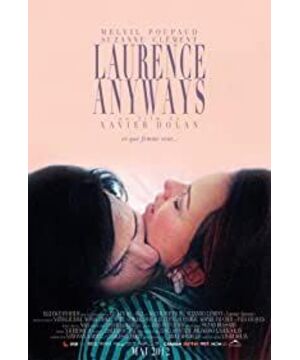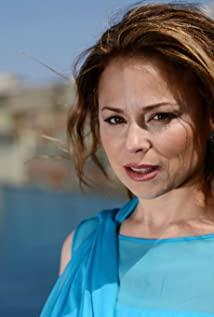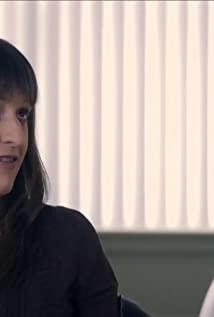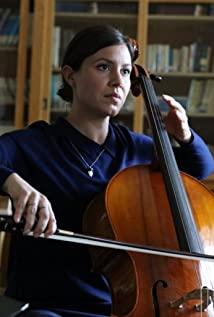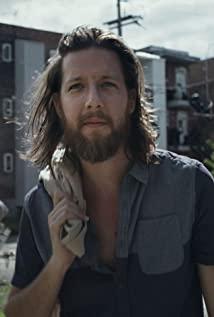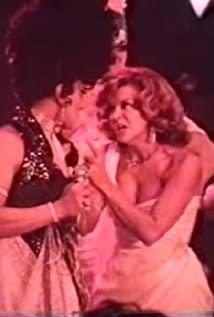About roles. I found that Dolan really likes to use acquaintances. From the ambiguous friend in the same class at the beginning, to the man who looks like a Greek sculpture, to the heroine in this film. Dolan's royal service was invited. All I can say is that the heroine's performance is really wonderful, so wonderful that it completely overwhelms the male lead's distinct personality. In the end, the male protagonist has nothing to remember except that he wants to change sex, keeps saying that he is a woman, and then keeps wearing skirts and painting women's clothes.
On the one hand, the film is too scattered, on the other hand, I have always had a question, does the male protagonist really want to become a woman? I don't think even he himself agrees.
Before this film, I have to mention another one, "Double Romeo". Its central idea is similar to that of Lawrence, except that the male protagonist is replaced by a "female protagonist". The point of success is that the director finds a real man to play a transgender "woman".
1. Double-sided Romeo
Romeo is a typical FTM type movie. The "male protagonist" Lucas, let's not say whether he loved men or women when he started. In many populations, Lucas was analyzed as a les at the beginning, and then became a straight man, because this "girl" finally fell in love with a boy. But we all ignore Lucas' own feelings. First of all, L himself fundamentally thinks of himself as a boy. Should have all masculine traits. When his best friend asked, "If you like boys, why don't you stand in our camp." L said confidently, "That's different."
"Are you a man or a woman?" This is Fabio in a bar Asked.
"Of course I'm a man." This was what L retorted at the time.
When F went to L's house to look for him, he caught his sister and warned him that you have to tell others that I am your brother Lucas and not your sister. At the end of the film, F finally knew about it and accepted him, and the two were together.
Should someone ask at the end, that F is why Gay accepts L. Did he get straight?
If we ignore L's original gender and only identify with his current gender, wouldn't it be easier. L will be simple enough to be transformed directly into the range of gay, instead of coming here to analyze him in the beginning when he was les, then straight, and finally gay again after transgender. So I think the gender classification has gone from simple to complex at the beginning. When people define a division structure for everything, they just want it to be simpler, more regulated and better managed, but they don't think that society is inherently diverse and complex. Simple structural divisions often fail to meet the needs of this society. So why not be straightforward when we ask questions.
Would "Do you like men or women?" would be easier than asking "Are you lesgaystraightbi..."?
Whether F can accept L in the end depends on "Can you have that thing in the end?"
"Of course." So from this point of view, can we say that F is gay?
Does everyone have the same question. You might fall in love with a Trans, a hermaphrodite, a dichromatic person. Maybe you know who he is, and then one day he will be forced to choose to stand in a camp. If you still love him in the end, is it impossible to define yourself and your love?
Then, when it's a gay pride festival, you can hide at home. Tell your mates, I'm not gay, I can't participate in any of your happy parades. I'm not gay, and I can't fight for same-sex marriage.
In fact, if this topic goes on, it will definitely involve de-gendering. So I say these kinds of films are like a bomb, maybe one day it will dismantle our notions of gender.
About other things, a makeup technique too realistic. At first I really thought that L was played by a woman because of his realistic breasts, but later I found out that the director was looking for a male actor. And L's previous photos are a bit similar to him. It's just that L himself is quite handsome.
The choice of the two male protagonists is quite in line with everyone's appetite. Fabio is totally my thing. robust! And he's a bit of South American ancestry, and I've never been able to figure out which group they belong to. After that, everyone watched it as if it were a gay movie, which may be the effect of L's selection of male actors.
2. Two-faced Lawrence - Freedom First
"On the health of regained health, the risk of no longer, and the hope without roots, I write your name. Freedom." This is the first of the two protagonists. A famous sentence written by the female protagonist on the back of the male protagonist during a reconciliation. This may reflect the desire in Lawrence's heart. He wanted to free the imprisoned woman in his heart, his primitive instinct, so he did it. He told his closest people, I'm a woman, and I thought I'd go crazy if I didn't. On his thirty-fifth birthday, when he sat in the cemetery thinking about his life, when he experienced death, when he was about to drown in this man's coat, tell the world that I am a woman. And after that? Is she free? And we're back to that old question, who do you love? Who are you?
Then the two lovers, the family and everything around him start to turn upside down and start a revolution.
"You're gay, it's no big deal." Afterwards, his girlfriend had a head-to-head conversation with him for the first time.
"I don't like men, I just shouldn't be born a man, it's different. Look, this is not me. This is not. And this, this is disgusting, I've been living like this for thirty-five years, it's a crime And I'm the criminal who stole a man's life."
"Whose life, Lawrence?"
"A woman's life, I deserve that woman's life."
"I love everything about you, you all Nasty. Is that what you mean?"
"Is that what you love about me?"
"So, should all of what we've been through should be redefined?"
Here, I think it's his girlfriend who should really be saved, and Lawrence isn't in the fog, it's his girlfriend. If we all fell in love with that person because of appearance or something, and that person started to be defined by us, so when that person subverts the boundaries in our hearts, we feel lost It's not who he is, but what role he should be.
Lawrence, he was born a woman. So we don't have to define who he is at all. He is in love with a woman like his girlfriend. Here, there may be some controversy over the male lead's performance. Should he act a little more feminine. Should he speak softer, should he be thinner and not walk like a man? If so, will it spoil the film? Being more feminine can only make the audience feel more empathy. This guy wants to be a girl? That's what I started saying, I didn't feel his desire to be a woman, in fact, he wasn't a woman at all.
But one thing, I suddenly understood. This man wants to become a woman like his girlfriend. They were wearing similar styles, and maybe Lawrence was learning how to talk, how to make up, what to do with her hair. Is there anything about his girlfriend that is more feminine than Lawrence?
Lawrence is like that. Maybe she doesn't love men or women. She only loves the type of her girlfriend, I think it doesn't matter if her girlfriend is male or female.
Do we have to determine who we are before we can find what we love? Or do we find what we love first and then decide which camp we stand in? I don't understand why it is necessary to draw a horizontal line in two. Or divided into three, four, five, six, seven, eight and nine? "I love you for who I am, and you have to know that I'm straightgaylestransbi... what does that have to do with me loving you?"
"It's Lawrence anyway..."
View more about Laurence Anyways reviews


